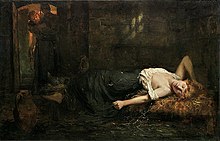Après moi, le déluge
| Part of a series on |
| Nihilism |
|---|
 |
|
"Après moi, le déluge" (pronounced [apʁɛ mwa lə delyʒ]; lit. 'After me, the flood') is a French expression attributed to King Louis XV of France, or in the form "Après nous, le déluge" (pronounced [apʁɛ nu lə delyʒ]; lit. 'After us, the flood') to Madame de Pompadour, his favourite.[1] It is generally regarded as a nihilistic expression of indifference to whatever happens after one is gone,[2] though it may also express a more literal forecasting of ruination.[3] Its meaning is translated by Brewer in the forms "When I am dead the deluge may come for aught I care", and "Ruin, if you like, when we are dead and gone."[4]
The phrase itself is in reference to the biblical flood[5] and is believed to date from after the 1757 Battle of Rossbach, which was disastrous for the French.[6] One account says that Louis XV's downcast expression while he was posing for the artist Maurice Quentin de La Tour inspired Madame de Pompadour to say: "Il ne faut point s'affliger; vous tomberiez malade. Après nous, le déluge."[7][note 1] Another account states that the Madame used the expression to laugh off ministerial objections to her extravagances.[4] The phrase is also often seen as foretelling the French Revolution and the corresponding ruin brought to aristocratic decadence.[8]
The remark is usually taken out of its original context. It was made in 1757, a year which saw the crushing defeat of the French army by the Prussians at the Battle of Rossbach and the assassination attempt on the King. The "Deluge" the King referred to was not a revolution, but the arrival of Halley's Comet, which was predicted to pass by the earth in 1757, and which was commonly blamed for having caused the flood described in the Bible, with predictions of a new deluge when it returned. The King was a proficient amateur astronomer, who collaborated with the best French astronomers. Biographer Michel Antoine wrote that the King's remark "was a manner of evoking, with his scientific culture and a good dose of black humor, this sinister year beginning with the assassination attempt by Damiens and ending with the Prussian victory". Halley's Comet finally passed the earth in April 1759, and caused enormous public attention and anxiety, but no floods.[9]
Karl Marx and Fyodor Dostoevsky apply the phrase in their writings to describe the selfishness and apathy of certain corrupting values.
Usage[]
Karl Marx wrote in Das Kapital (Vol. 1, Part III, Chapter Ten, Section 5) "Après moi, le déluge! is the watchword of every capitalist and of every capitalist nation. Hence Capital is reckless of the health or length of life of the labourer, unless under compulsion from society."[10]
During the trial of Dimitri Fyodorovich Karamazov in The Brothers Karamazov by Dostoyevsky, the prosecution uses the expression to describe the attitude of the defendant's reprobate father and to lament the deterioration of Russian values more generally. He previously used it in The Idiot, as an epigraph for an article written by one of the characters of the novel.
In his writings of the 1920s, D. H. Lawrence uses the expression a number of times, calling it "the tacit utterance of every man", in his "crisis" of unbearable "loneliness ... surrounded by nullity".[11] But "you mustn't expect it to wait for your convenience," he warns the dissolute "younger generation";[12] "the real deluge lies just ahead of us".[13]
"Après moi le déluge" was adopted as the motto of the Royal Air Force 617 Squadron, which carried out the "Dambuster" raids on German dams in the Ruhr region on the night of 16–17 May 1943.
See also[]
Notes[]
- ^ transl. "There is no need to grieve; you'll make yourself ill. After us, the deluge."
References[]
- ^ Mould 2011, p. 43; Lexico.
- ^ Nishitani 1990; Lexico
- ^ Laguna 2006.
- ^ a b Brewer 1898.
- ^ Ammer 2013.
- ^ Mould 2011, p. 43.
- ^ Mould 2011, p. 43
- ^ Farlex.
- ^ Antoine (1989) pages 740–41
- ^ Das Kapital, Chapter 10
- ^ "The Crown", IV (1925) in Reflections on the Death of a Porcupine and Other Essays (Cambridge: Cambridge University Press, 1988), p280.
- ^ "Latter-Day sinners" from Pansies (1928) in Poems, Volume 1 (Cambridge: Cambridge University Press, 2013), p461.
- ^ "The Memoires of Duc de Lauzun", Version 1 (1926) in Introductions and Reviews (Cambridge: Cambridge University Press, 2005), p91. Lawrence also uses the phrase in "Whitman" (1923), calling it "the soul's last shout and shriek, on the confines of death", Studies in Classic American Literature (Cambridge: Cambridge University Press, 2003), p155.
Sources[]
- Ammer, Christine (2013). "Après moi le déluge". The Dictionary of Clichés: A Word Lover's Guide to 4,000 Overused Phrases and Almost-Pleasing Platitudes. Dictionary of Clichés. New York: Skyhorse Publishing. ISBN 978-16263-6011-2.
- Brewer, Ebenezer Cobham (1898). "Del'uge". Dictionary of Phrase and Fable. Retrieved 17 October 2020 – via Bartleby.com.
- Laguna, Gabriel (13 January 2006). "The Expression 'Après moi le déluge', and Its Classical Antecedents". Tradición Clásica. Blogspot.com. IBSN 30-48-327-363.
{{cite web}}: CS1 maint: date and year (link)[self-published source] - Mould, Michael (2011). The Routledge Dictionary of Cultural References in Modern French. Routledge. p. 43. ISBN 978-0-203-83092-5.
- Nishitani, Keiji (1990). McCormick, Peter J. (ed.). The Self-Overcoming of Nihilism. Translated by Graham Parkes; with Setsuko Aihara. State University of New York Press. ISBN 0791404382.
- "Apres moi le deluge". Farlex Dictionary of Idioms. Farlex. 2015. Retrieved 15 December 2020.
- "Après nous le déluge". Lexico. Oxford. Retrieved 17 October 2020.
- 18th century in France
- Catchphrases
- French words and phrases
- Nihilism
- 1750s neologisms